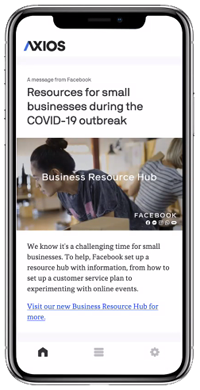Axios launched its first mobile app on Wednesday two weeks earlier than planned in order to take advantage of the explosion in engagement with news content during the pandemic.
The news site had more than 26 million unique visits in March, a record, said Mike Berkley, chief product officer at Axios. Of that web traffic, roughly 75% came from mobile devices.
“We saw a real need in the market for this and we didn’t want to wait,” he said. “People really need it now.”
The app has been in beta since mid-February, and is now available for iOS. (Update: The Android version became available on Thursday.)
Axios is primarily a newsletter-based business, with 20 newsletters ranging across politics, media, tech, sports, health and finance.
But email newsletters have “some real deficiencies,” Berkley said.
“You can’t play video or audio in [newsletters] and they don’t update after you publish them,” he said. “We see the app as a much more immersive experience in terms of watching and listening, which we think is the future of Axios.”
Content within the app is organized into channels curated by Axios journalists. There’s a channel featuring coronavirus-related content, for example, and another related to the economic markets. The app also serves as a repository for all of Axios’ daily and weekly newsletters.
“The main use case for the app is to catch you up on what matters to you,” said Marcus Moretti, lead product manager on the app.
Users can follow channels and newsletters to create a personalized feed of regularly updated Axios news, and sign up for push notifications for breaking news alerts. The app is continually updated in the background and works offline with no network connection.
Axios isn’t selling ad space in the app. But native ads from the newsletters and the main Axios site will flow into corresponding placements within the app as a bonus without any extra cost to the advertiser. Advertisers will also be able to sponsor channels on an impression basis. Facebook is Axios’s launch sponsor.
In addition to stories from the site and Axios newsletters, the app has some exclusive content, including original posts, newsletter updates and brief “thought bubbles” about trending topics. The writers will also be able to share articles from other news sources and their own added notations on why the story matters, “kind of similar to Twitter,” Berkley said.
The app is free to access with no login required, although Axios is working on a feature, not available at launch, that will allow existing subscribers to sign in in order to see a pre-populated personalized content feed.














